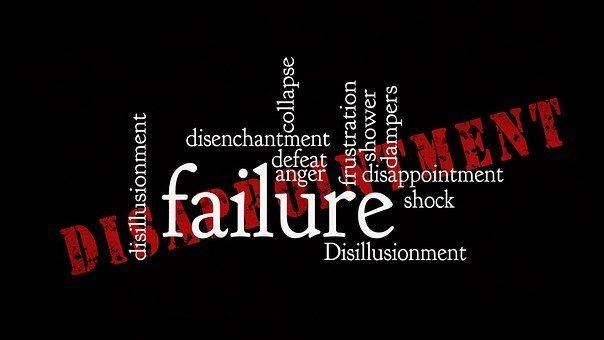The 5 Unexpected Gifts of Failure

“Failure is just life trying to move us in another direction.” Oprah Winfrey
It is natural to think of things as binary – if something is positive, its opposite must be negative. Good v/s bad, black v/s white, and similarly, success v/s failure. This might lead to the assumption that success is desirable and is failure undesirable.
This is a mistake conditioned from the moment we are born, through school, college, and our experiences in life. It is not that in life we either succeed or we fail; before we succeed, we may fail several times as Harry Potter author JK Rowling’s discovered. What kept her going was the belief in herself and her books. She says, “It is impossible to live without failing at something unless you live so cautiously you might as well not have lived at all – in which case, you fail by default.”
Often, failure can cause dejection to set in. But perhaps failure can act as a springboard for the path meant for us.
I myself have failed many times throughout my life.
But every instance has been both a challenge and a learning experience. While they have been difficult, they have also been sources of strength and catalysts for transformation.
A recurring failure in my life has been my battle with my health and weight. What was most disappointing was the harder I tried, the further away the goal seemed. I felt helpless, and eventually was forced to learn the art of surrender and acceptance.
Another area where I have felt like a failure is with my profession – with failed expectations and missed ambitions. Yet somehow, each failure opened new opportunities that I would have not otherwise imagined.
And who hasn’t faced failure in relationships? Talk about failing on an “epic scale”, as JK Rowling puts it. From attracting unhealthy relationships to intense betrayal to pushing others away who were thoughtful and kind. Each experience, while hard in the face of it, culminated into me becoming more patient, understanding, and measured
But even after experiencing failure in various ways and on various occasions, one learning has been constant – to not allow the past to determine my future, which is also one of the many transformational premises that I teach during Breakthrough Coaching with NLP Training. This powerful shift in thinking means that those who attend the intensive 7 day program are able to manifest their dreams with speed and ease.
Instead, as I reflect upon my failures and learn from them, I have put together the 5 reasons why failure has turned out to be a gift rather than a curse.
Here are the 5 gifts of failure; they help you to:
1. Find What You Love
Sometimes, you may miss out on important opportunities because you aren’t clear on what you want. You may become frustrated by the lack of a definite goal.
Failure provokes you to give thought to alternative goals. It is a great opportunity to stop and rethink your path.
After a jolt, you have the wonderful chance to assess yourself and your motives better. You learn to keep revisiting and reshaping your goal, making it better with each failure.
The author of bestselling novel Eat Pray Love, Elizabeth Gilbert shares how she failed to get published for almost 6 years. Each rejection was devastating and she wanted to give up. Yet, in the end, she became even more committed to what she truly wanted for herself.
“I had to ask myself if I should just quit while I was behind and give up and spare myself this pain. But then I would find my resolve, and always in the same way, by saying, ‘I’m not going to quit, I’m going home.’” For Elizabeth “going home” meant returning to writing as she realized she loved writing more than the disliked failing to get published.
Failure helps you find your home.
Through my failures, I realized what I am most passionate about is presenting on stage and training others to be more than they ever thought possible – empowering others to transform their lives in ways they could never have imagined. As I get on stage and look into the eyes of the audience and feel their presence and energy, I feel alive.
2. Make Peace With Your Fears
A little boy sets foot on a basketball field for his first-ever game. He is frightened of falling, of getting hit by the ball or being kicked or elbowed by another player. The bell sounds and the match begins. His teammate passes him the ball, he dribbles till the basket, jumps to shoot, misses, and falls flat on his face. He has hurt his lip and it bleeds. He gets up and instead of sitting out, he makes his way back to his position. “There,” he thinks, “I fell. And it barely hurts. I am stronger than the fear of falling.” The bell sounds and his teammate once again passes him the ball, he dribbles till the basket, jumps to shoot, scores, and lands on his feet.
Failing at something relieves you of the tension and anxiety about your actions. JK Rowling acknowledges this in her commencement speech at Harvard, where she says, “I was set free because my greatest fear had been realised and I was still alive…rock-bottom became the solid foundation on which I rebuilt my life.”
Failure will make you confront your fears – after, you can choose whether to let it make you.
3. Never To Give Up
I remember once failing an exam at University. The fault of the failure was entirely mine – I had neither studied nor attended class. I was forced to retake the exam, owing to which I was unable to visit my parents in India over the summer.
I remember feeling ashamed, embarrassed, and humiliated. Nevertheless, I passed the examination. My other scores were fantastic and I would have received a First Class Honours Degree. But because of having to retake that test, I received a Second Class, First Division Honours Degree (2.1).
In hindsight, I’m proud of my 2.1, because this failure taught me to never give up. Instead, I knuckled back with a newfound determination and developed a single-minded focus on my studies. Because of this ability to motivate myself and stay true to my goals, I was eventually accepted at Oxford University with a full scholarship.
I am reminded of the pre-suppositions of Neuro-linguisitc programming, which are essentially empowering beliefs. The purpose of these beliefs, if you choose to believe them, is to equip you to handle a plethora of experiences with maturity and ease:
- There is no failure, only learnings
- Everyone is doing the best they can with the resources they have
3. Become Stronger
If you allow failure to break your spirit, it will. I was painfully faced with such a situation, wherein I was shocked to discover 24 hours before a seminar that my business partner had not booked the venue for the seminar. It was high season in Mumbai and no venues available, and I had 250 people to accommodate. It put immense pressure on my team and me to recover the situation.
Despite that we made it, in the end, it broke me completely. I lost the will to present seminars and lay in bed for a month, feeling distraught
As I unraveled the learnings from the episode and made peace with my disbelief I discovered an inner strength and trust. It made me stronger – not tougher, but softer.
5. Work Smarter, Not Harder
While failure can be a gift in disguise, uninterrupted success can be a veiled poison. Success without failure might cause complacency and an overconfidence of being infallible and in need of no improvement. Failure can bring about an awareness of what changes are needed. It can enable improvements that may not have been possible before.
Apple, for example, was not always successful. With a line of disasters prior to the iPhone, the company learned from its mistakes to eventually become one of the market leaders in the smartphone industry. Thus, failure allows space for constructive thinking and a leap forward in performance.
All in all, failure is not entirely undesirable. It is a gift that enables laser-like determination and focus on what is really important. While failure can break you, it can also make you. I can gratefully say that my failures have shaped who I am today and been instrumental in my success.
If you have experienced failure and want to make peace with it and use it as a springboard for success, then the audio process below, based on Breakthrough Coaching & NLP, is ideal for you.
Love Dr Rangana Rupavi Choudhuri (PhD) with Ashni Archarya
Our entry level programs:
- Coach yourself and others to create the life of dreams – Breakthrough Coaching with NLP
- Heal Illness and Awaken to Source – The Journey Healing Seminars
- For Stress Relief and to become a practitioner – Emotional Freedom Techniques
For the full calendar of events.
Other articles you may be interested in:
- How can Coaching help you- What is effective Coaching?
- How to Re-kindle your relationships- Happy Valentine’s Day
- I am no longer haunted by my past
- The 5 ways suppressed and unresolved emotions can be harmful.
- Can happiness be attained on the outside? The 7 keys to happiness!
- What stopped me from achieving – Limiting beliefs!
- Can dreams really manifest?
- How to live the life of your dreams? 7steps you can follow and the 8th one







